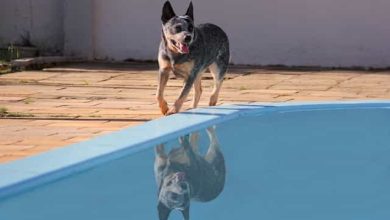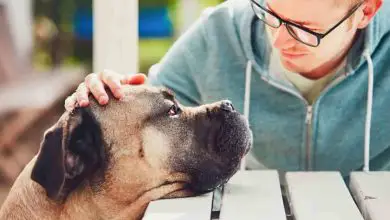Why Does My Dog Lick and then Nibble Me?
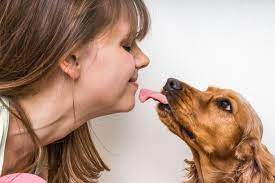

Have you ever wondered why your furry companion showers you with wet kisses only to follow it up with nibbling? While dogs engage in various behaviors to communicate and express their feelings, the lick and nibble behavior can sometimes leave pet owners puzzled. In this article, we will delve into the reasons behind this behavior and explore ways to address it. So, let’s get started and understand the fascinating world of canine behavior!
Understanding Dog Behavior
Dogs are social animals that communicate through a combination of body language, vocalizations, and behaviors. As pet owners, it’s essential to decipher these actions to better understand our furry friends and build a stronger bond with them. One common behavior exhibited by dogs is licking followed by nibbling, which can occur during various situations and for different reasons.
The Lick and Nibble Behavior Of Dogs
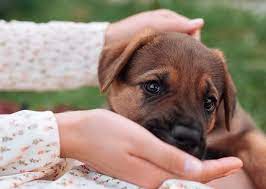

The lick and nibble behavior typically involves your dog licking your skin or clothing and then gently nibbling or mouthing. This behavior is often seen as a form of communication or affectionate gesture. While it may seem unusual to us, it is a natural behavior for dogs and can stem from a variety of underlying reasons.
Reasons Why Dogs Lick and Nibble
Let’s explore some of the common reasons why dogs engage in the lick-and-nibble behavior:
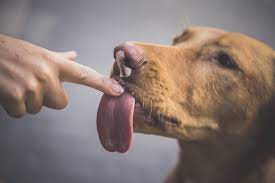

Affection and Bonding
Dogs are known for their unwavering loyalty and love for their owners. Licking and nibbling can be their way of showing affection and strengthening the bond they share with you. It is their version of a doggie kiss, and it’s their special way of expressing their love.
Exploration and Curiosity
Dogs often use their mouths to explore the world around them. By licking and nibbling, they are trying to gather information about their environment, including the taste, texture, and scent of objects or people they encounter. It’s their way of satisfying their curiosity and getting to know you better.
Communication and Attention
Licking and nibbling can also serve as a form of communication. Dogs may engage in this behavior to grab your attention or convey a message. They might be seeking interaction, asking for playtime, or signaling their needs, such as hunger or a need to go outside. It’s their way of saying, “Hey, pay attention to me!”
Submission and Appeasement
In some cases, dogs may lick and nibble as a submissive or appeasement gesture. They might do this to show respect or deference to you as the dominant figure in their social hierarchy. It’s their way of acknowledging your authority and establishing harmony within the pack.
Grooming and Cleaning
Dogs are naturally clean animals and often groom themselves and their pack members. Licking and nibbling can be a grooming behavior, especially if they focus on certain areas like your hands or face. They may be trying to clean you or remove any dirt or odor they detect.
Taste and Sensory Stimulation
Similar to humans, dogs have taste buds and enjoy different flavors. Licking and nibbling can provide sensory stimulation, allowing them to taste your skin or the residue of food or scents on you. It can be a pleasurable experience for them, and they may simply find it enjoyable.
Stress and Anxiety
Just like humans, dogs can experience stress and anxiety. In some cases, excessive licking and nibbling can be a sign of nervousness or unease. It can be a self-soothing behavior that helps them cope with stressful situations or alleviate anxiety. If you notice this behavior accompanied by other signs of anxiety, it’s essential to address the underlying causes.
Habitual Behavior
In certain instances, licking and nibbling can become a habitual behavior for dogs. If they have been rewarded for this behavior in the past or if it has become a comforting routine for them, they may continue doing it. Habitual behaviors can be challenging to change but with consistent training and redirection, it’s possible to modify their habits.
See also: Why do border collies lick so much
Dealing with Lick and Nibble Behavior of a dog
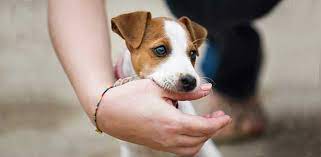

If the lick-and-nibble behavior becomes excessive or bothersome, there are several approaches you can take to manage and redirect it:
Using good training techniques, such as praise, treats, and rewards, can help reinforce desirable behavior. Whenever your dog displays calm behavior instead of licking and nibbling, provide verbal praise or a treat to encourage them.
Redirecting the Behavior
When you notice your dog starting to lick or nibble, redirect their attention to an appropriate chew toy or interactive game. By offering an alternative, you provide them with an acceptable outlet for their chewing and mouthing tendencies.
Providing Alternatives
Ensure your dog has plenty of toys and interactive puzzles to keep them mentally stimulated. Engaging their mind and providing appropriate outlets for their energy can help reduce the urge to engage in unwanted behaviors like excessive licking and nibbling.
Conclusion
The lick and nibble behavior displayed by dogs can have multiple interpretations and motivations. From expressing affection and seeking attention to exploring their environment and grooming, dogs have various reasons for engaging in this behavior. By understanding their needs and using positive reinforcement techniques, you can effectively manage and redirect this behavior while nurturing a strong bond with your furry companion.
FAQs on why does my dog lick and nibble me
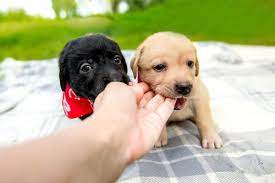

Here are the most FAQs on Why does my dog lick and nibble me:
Why does my dog lick and nibble my face?
Licking and nibbling your face can be a sign of affection and a way for your dog to bond with you. It can also be a grooming behavior or an attempt to get your attention.
Is it normal for dogs to lick and nibble their paws?
Dogs licking and nibbling their paws can be a sign of allergies, skin irritation, or anxiety. If the behavior becomes excessive or leads to skin damage, it’s best to consult a veterinarian.
How can I discourage my dog from excessive licking and nibbling?
Redirecting their attention to appropriate chew toys, providing mental stimulation, and using positive reinforcement can help discourage excessive licking and nibbling.
See also: Are Dog Paw Pads Supposed to be Rough?
Why does my dog lick and nibble me when I’m sleeping?
Licking and nibbling during sleep can be a sign of affection or a way for your dog to wake you up and seek attention. It’s their way of saying, “Good morning, let’s play!”
Should I be concerned if my dog’s lick and nibble behavior suddenly change?
If your dog’s behavior drastically changes or is accompanied by signs of distress or discomfort, it’s recommended to consult with a veterinarian to rule out any underlying health issues.

